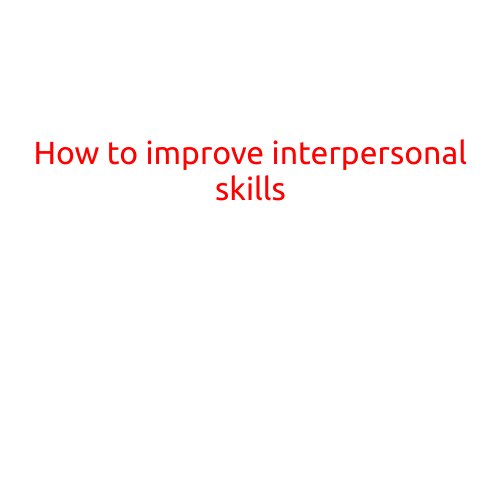
How to Improve Interpersonal Skills
Effective interpersonal skills are essential for success in both personal and professional settings. Being able to communicate effectively, build strong relationships, and navigate social situations with ease can make a significant difference in your life. However, improving interpersonal skills takes practice, patience, and a willingness to learn and adapt. In this article, we will provide you with practical tips and strategies to help you improve your interpersonal skills.
Why are Interpersonal Skills Important?
Interpersonal skills are crucial for building strong relationships, resolving conflicts, and achieving personal and professional goals. They enable you to:
- Communicate effectively with others
- Build trust and rapport with colleagues, friends, and family members
- Navigate complex social situations with ease
- Resolve conflicts and negotiate effectively
- Achieve your personal and professional goals
Tip 1: Practice Active Listening
Active listening is the foundation of effective communication. It involves fully concentrating on what the other person is saying, understanding their perspective, and responding appropriately. To practice active listening, try the following:
- Give the speaker your undivided attention
- Maintain eye contact and avoid distractions
- Ask clarifying questions to ensure you understand the message
- Repeat back what you’ve heard to show that you’re paying attention
- Avoid interrupting or finishing the speaker’s sentences
Tip 2: Develop Your Emotional Intelligence
Emotional intelligence involves being aware of and managing your own emotions, as well as being able to empathize with others. Developing your emotional intelligence can help you:
- Better understand others’ perspectives and emotions
- Build stronger relationships
- Resolve conflicts more effectively
- Communicate more effectively
To develop your emotional intelligence, try:
- Practicing mindfulness and self-awareness
- Learning to recognize and manage your emotions
- Developing empathy and understanding towards others
Tip 3: Improve Your Body Language
Your body language can convey just as much information as your words. Good body language can help you build trust and rapport with others, while bad body language can create tension and conflict. To improve your body language, try:
- Maintaining eye contact and avoiding distractions
- Using open and approachable body language (e.g., uncrossing your arms or standing up straight)
- Avoiding crossing your arms or legs, which can create a barrier between you and others
- Smiling and using facial expressions to show interest and engagement
Tip 4: Develop Your Conflict Resolution Skills
Conflict is inevitable in any relationship or situation. Developing your conflict resolution skills can help you navigate these situations more effectively. To improve your conflict resolution skills, try:
- Staying calm and composed, even in tense situations
- Listening actively and trying to understand the other person’s perspective
- Focusing on finding a mutually beneficial solution
- Avoiding attacking or defensive behavior
Tip 5: Practice Positive Communication
Positive communication is essential for building strong relationships and achieving personal and professional goals. To practice positive communication, try:
- Using positive and constructive language
- Avoiding criticism or complaining
- Focusing on solutions rather than problems
- Being open-minded and receptive to others’ ideas and perspectives
Conclusion
Improving your interpersonal skills takes time and practice, but the benefits are well worth the effort. By following these tips and strategies, you can build stronger relationships, communicate more effectively, and achieve your personal and professional goals. Remember to be patient and persistent, and don’t be afraid to make mistakes along the way. With time and effort, you can become more confident and effective in your personal and professional interactions.





